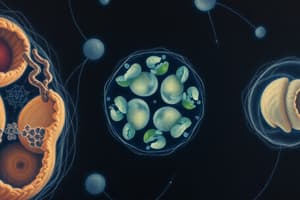Podcast
Questions and Answers
Which of the following accurately describes the process of Mitosis?
Which of the following accurately describes the process of Mitosis?
- Involves the production of four non-identical cells
- Only occurs in reproductive cells
- Results in genetic variation among the daughter cells
- Involves only somatic cells (correct)
What are the three major checkpoints in the Cell Cycle?
What are the three major checkpoints in the Cell Cycle?
- S, M, G0
- G1, S, G2
- G1, M, G2 (correct)
- M, G2, G0
During which phase of Interphase does DNA replication occur?
During which phase of Interphase does DNA replication occur?
- S phase (correct)
- G2 phase
- G1 phase
- M phase
What happens to chromosomes during Anaphase?
What happens to chromosomes during Anaphase?
What is the final step of Mitosis?
What is the final step of Mitosis?
What are the phases of Interphase?
What are the phases of Interphase?
Which phase of the Cell Cycle is characterized by cell growth and decision-making?
Which phase of the Cell Cycle is characterized by cell growth and decision-making?
Which type of cells undergo Mitosis?
Which type of cells undergo Mitosis?
Flashcards are hidden until you start studying
Study Notes
Cell Cycle Overview
- The cell cycle is essential for growth, repair, and replacement of cells.
- Major phases include Interphase and Mitosis or Meiosis.
Interphase
- Composed of three phases: G1 (Gap 1), S (Synthesis), and G2 (Gap 2).
- G1: Decision-making phase; cells can continue the cycle or enter G0 (a state of permanent differentiation).
- S: DNA replication occurs, leading to the expansion of the nucleus; the cell remains diploid (2n).
- G2: The cell grows and prepares for cell division.
Mitosis
- Involves only somatic cells (non-reproductive cells).
- One somatic cell divides to produce two identical daughter cells.
Stages of Mitosis
- Prophase: The nucleolus disappears, and chromatin condenses into chromosomes.
- Metaphase: Chromosomes align along the metaphase plate.
- Anaphase: Chromosomes split at their centromeres; sister chromatids move to opposite poles.
- Telophase: Chromosomes de-condense back into chromatin; the nuclear membrane starts to reform, and the nucleolus reappears.
- Cytokinesis: Division of the cytoplasm, completing cell division.
Comparison of Mitosis and Meiosis
- Mitosis results in two identical daughter cells, while meiosis leads to four genetically diverse gametes.
- Mitosis is crucial for growth and tissue repair, while meiosis is essential for sexual reproduction.
Major Checkpoints in the Cell Cycle
- Checkpoints help to ensure proper cell division and can halt the cycle if problems are detected.
- Key checkpoints occur at G1 (restriction point), G2 (DNA damage checkpoint), and the metaphase of mitosis (spindle assembly checkpoint).
Diseases Associated with Cell Cycle Malfunctions
- Cancer: Characterized by uncontrolled cell growth and division; potential treatments include surgery, chemotherapy, and radiation.
- Down Syndrome: Caused by an extra chromosome 21; characterized by distinctive physical features, developmental delays, and potential for various health issues.
Visual Learning
- Use an onion (Allium cepa) root tip slide under a microscope to identify stages of meiosis.
Awareness Campaigns
- Create child-friendly posters to educate about the implications of Cancer or Down Syndrome.
Studying That Suits You
Use AI to generate personalized quizzes and flashcards to suit your learning preferences.




